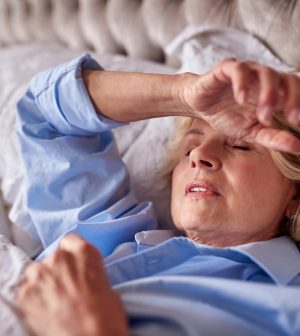- Techniques for Soothing Your Nervous System
- Does the Water in Your House Smell Funny? Here’s Why
- Can a Daily Dose of Apple Cider Vinegar Actually Aid Weight Loss?
- 6 Health Beverages That Can Actually Spike Your Blood Sugar
- Treatment Options for Social Anxiety Disorder
- Understanding the Connection Between Anxiety and Depression
- How Daily Prunes Can Influence Cholesterol and Inflammation
- When to Take B12 for Better Absorption and Energy
- Epsom Salts: Health Benefits and Uses
- See What Saffron Can Do for Sleep and Heart Health
Night Sweats May Be Even Tougher Than Hot Flashes on Women

It’s not anyone’s idea of a fun choice, but researchers recently asked 200 women which part of menopause is worse for them – hot flashes or night sweats?
Both can significantly affect a woman’s quality of life, but night sweats may be the most stressful, their study found.
“We know that sleep disturbances are one of the biggest detriments for women going through menopause, but these results are unique because they show that women experiencing night sweats, rather than just hot flashes, may be at an even bigger disadvantage,” said study author Sofiya Shreyer, a graduate student in anthropology at the University of Massachusetts, Amherst.
Night sweats and hot flashes may sound similar, but they’re not the same. A hot flash happens day or night and may not include sweating. Night sweats are periods of intense perspiration during the night.
Night sweats were significantly associated with depression and stress. Even when they happened at night, hot flashes were associated with depression alone, the investigators found.
And women whose hot flashes happened more often at night had significantly higher depression scores than those whose hot flashes occurred most during the day.
“This study adds to the growing evidence that menopause symptoms such as hot flashes and night sweats can significantly detract from a woman’s quality of life and should be taken seriously by health care professionals,” said Dr. Stephanie Faubion, medical director of the North American Menopause Society (NAMS).
“More research is necessary to fully understand the mechanisms of these symptoms and their overall effect on a woman’s menopause experience,” she noted in a NAMS news release.
The findings were scheduled for presentation this week during NAMS’ annual meeting, in Atlanta. Findings presented at medical meetings should be considered preliminary until published in a peer-reviewed journal.
More information
The U.S. National Institute on Aging has more about menopause and its symptoms.
SOURCE: The North American Menopause Society, news release, Oct. 12, 2022
Source: HealthDay
Copyright © 2026 HealthDay. All rights reserved.










